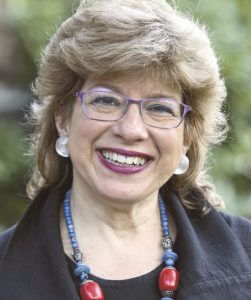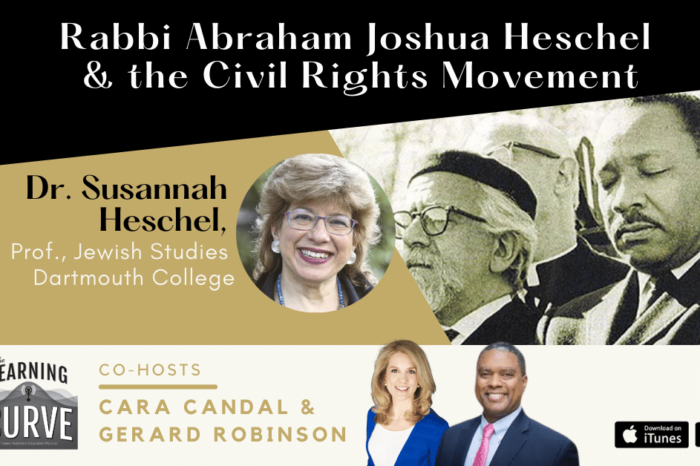Dartmouth’s Prof. Susannah Heschel Discusses Rabbi Abraham Joshua Heschel & the Civil Rights Movement
This week on “The Learning Curve,” Gerard and Cara talk with Dr. Susannah Heschel, the Eli M. Black Distinguished Professor of Jewish Studies at Dartmouth College, and the daughter of noted 20th-century Jewish theologian and Civil Rights-era leader, Rabbi Abraham Joshua Heschel. They discuss what teachers and students today should know about Rabbi Heschel’s life and legacy. Born in Warsaw, Poland, the descendant of preeminent European rabbis, Rabbi Heschel was arrested by the Gestapo, and later escaped to London. Prof. Heschel describes how losing many family members in the Holocaust shaped her father’s writings, and brought moral urgency to his American Civil Rights efforts. Prof. Heschel describes her father’s landmark study, The Prophets, for which she wrote an introduction, his profound view of the prophets as models, and his search for enduring “truth and righteousness in everyday life.” They discuss Dr. Martin Luther King, Jr., who evoked Old Testament imagery in many of his most memorable speeches, and who was accompanied by Rabbi Heschel on the Voting Rights march from Selma to Montgomery. Professor Heschel offers thoughts on what educators can learn from her family’s historic experiences facing adversity, and how citizens, teachers, and students alike can use personal stories, biblical wisdom, and ancient sources to inspire their civic action in our often divided country. She concludes with a reading from a favorite passage from one of her father’s books.
Stories of the Week: Which states are driving innovation in K-12 education, and which are struggling? Cara and Gerard discuss recent rankings, and some surprising results. The Kentucky Legislature passed a bill that would allow income-eligible families to access tax credit scholarships for private school tuition and other services, overriding the Governor’s veto.
Guest:
 Dr. Susannah Heschel is the Eli M. Black Distinguished Professor and chair of the Jewish Studies Program at Dartmouth College. She is the author of Abraham Geiger and the Jewish Jesus, The Aryan Jesus: Christian Theologians and the Bible in Nazi Germany, and Jüdischer Islam: Islam und jüdisch-deutsche Selbstbestimmung, and she and Umar Ryad have co-edited The Muslim Reception of European Orientalism. She has also edited Moral Grandeur and Spiritual Audacity: Essays of Abraham Joshua Heschel. She is currently writing a book with Sarah Imhoff, Jewish Studies and the Woman Question. She is a Guggenheim Fellow and has held fellowships at the National Humanities Center and the Wissenschaftskolleg zu Berlin.
Dr. Susannah Heschel is the Eli M. Black Distinguished Professor and chair of the Jewish Studies Program at Dartmouth College. She is the author of Abraham Geiger and the Jewish Jesus, The Aryan Jesus: Christian Theologians and the Bible in Nazi Germany, and Jüdischer Islam: Islam und jüdisch-deutsche Selbstbestimmung, and she and Umar Ryad have co-edited The Muslim Reception of European Orientalism. She has also edited Moral Grandeur and Spiritual Audacity: Essays of Abraham Joshua Heschel. She is currently writing a book with Sarah Imhoff, Jewish Studies and the Woman Question. She is a Guggenheim Fellow and has held fellowships at the National Humanities Center and the Wissenschaftskolleg zu Berlin.
The next episode will air on Wednesday, April 7th, 2021 at 12 pm ET with guest, Professor Bettany Hughes, an award-winning historian, BBC broadcaster, and author of the best-selling books Helen of Troy: Goddess, Princess, Whore; The Hemlock Cup: Socrates, Athens, and the Search for the Good Life; and Venus and Aphrodite: History of a Goddess.
Tweet of the Week:
45 states have prioritized educators getting vaccinated. The @CDCgov has created a toolkit that will help schools communicate with their staff about vaccination. It has everything you need to make sure everyone is educated about the process. Check it out: https://t.co/06bflkz7wW
— Secretary Miguel Cardona (@SecCardona) March 28, 2021
News Links:
Which U.S. States Are Best Positioned to Innovate? How K-12 Schools Influence the Rankings
Gov. Beshear vetoes school choice bill that narrowly cleared Kentucky General Assembly
Get new episodes of The Learning Curve in your inbox!
Recent Episodes:















